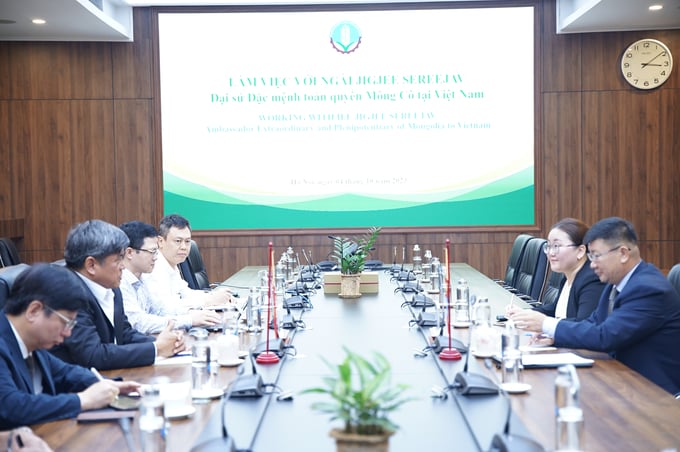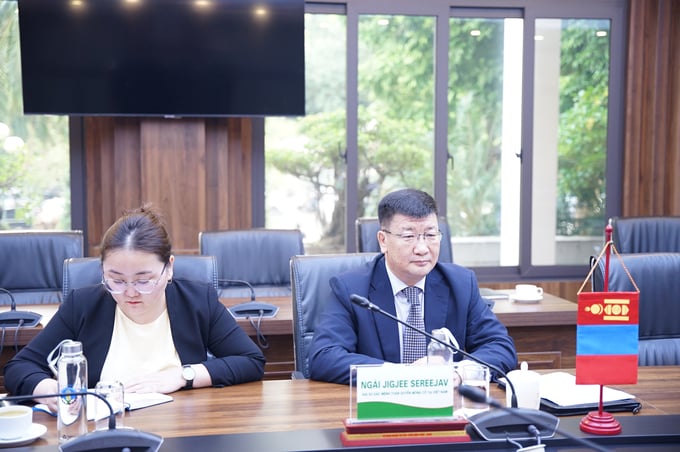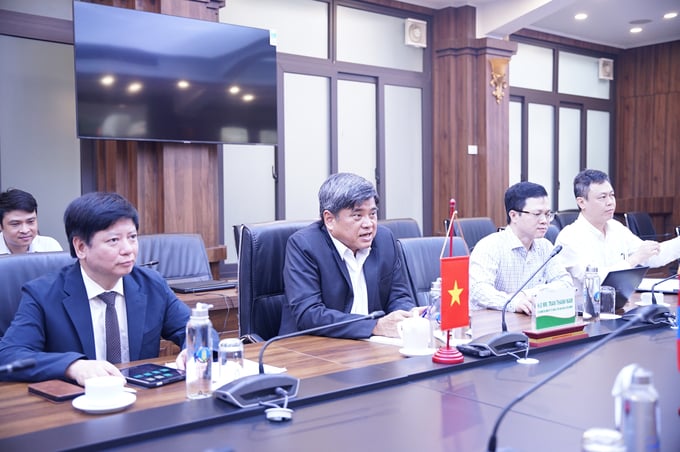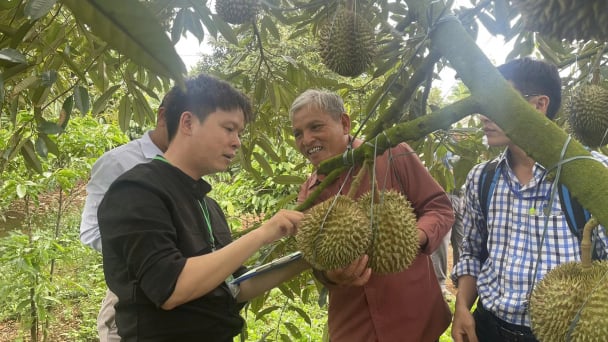June 1, 2025 | 04:14 GMT +7
June 1, 2025 | 04:14 GMT +7
Hotline: 0913.378.918
June 1, 2025 | 04:14 GMT +7
Hotline: 0913.378.918

On October 4, Deputy Minister of Agriculture and Rural Development Tran Thanh Nam received and worked with Ambassador Extraordinary and Plenipotentiary of Mongolia to Vietnam Jigjee Sereejav.
On October 4, Deputy Minister of Agriculture and Rural Development Tran Thanh Nam met with and collaborated with Ambassador Extraordinary and Plenipotentiary of Mongolia to Vietnam Jigjee Sereejav, discussing cooperation contents and activities in preparation for coming state visit of the Mongolian President to Vietnam, as well as agricultural cooperation in the near future.
The meeting took place in the context of the Ministry of Agriculture and Rural Development, the Chairing Agency of the Vietnam Subcommittee of the Intergovernmental Committee, and the Chairman of the Vietnam - Mongolia Friendship Association working to find solutions to advance bilateral cooperation.
In 2022, the Ministry of Agriculture and Rural Development organized three delegations to Mongolia, including a working group led by Deputy Minister and Chairman of the Vietnam - Mongolia Friendship Association Tran Thanh Nam to attend the Business Forum and review cooperation in preparation for the 18th Meeting of the Intergovernmental Committee; the delegation attended the 18th UBLCP Meeting led by Minister of Agriculture and Rural Development Le Minh Hoan.
Vietnam and Mongolia are also planning numerous events to commemorate the 70th anniversary of the establishment of diplomatic relations (17 November 1954 - 17 November 2024).
According to Ambassador Jigjee Sereejav, the Mongolian party is also interested in expanding bilateral cooperation in all disciplines, including agriculture. In describing the potential of Mongolia's livestock products, the ambassador noted that agricultural products and livestock flesh have been exported to numerous countries since June of this year. For instance, horse meat is exported to Japan, lamb meat to Egypt, and whole goat meat to China. Mongolia also imports poultry products from Vietnam.

Ambassador Extraordinary and Plenipotentiary of Mongolia to Vietnam Jigjee Sereejav said that the Mongolian side also wants to expand cooperation between the two countries in all fields, especially in the field of agriculture. Photo: Linh Linh.
In the past two years, however, difficulties have persisted in promoting the export of goat and sheep flesh products from Mongolia to Vietnam. The Ambassador proposed that the veterinary agencies of both countries collaborate to facilitate the export of livestock products from Mongolia to Vietnam under favorable conditions.
The Ambassador proposed that the Ministry and pertinent agencies establish conditions for the unification of the veterinary certificates of the two countries in order to provide a foundation for businesses on both sides to engage in trade. In addition, Mongolia is interested in collaborating with Vietnam in the areas of veterinary medicine, vaccines, and livestock.
Ambassador Jigjee Sereejav reported that the commerce volume between the two countries in 2022 reached 75 million USD, compared to 65 million USD in the first half of this year. With this encouraging indicator, this year's expected trade volume between the two parties is 100 million USD.
As for the Ministry of Agriculture and Rural Development, Deputy Minister Tran Thanh Nam concurred that the cooperation transition between the two parties could increase by promoting agricultural product and tourism cooperation.

Deputy Minister Tran Thanh Nam said that the cooperation turnover between the two sides can develop further by promoting cooperation in agricultural products and tourism.
Concerning difficulties in exporting goat and sheep meat from Mongolia to Vietnam, Director of the Department of Animal Health Nguyen Van Long stated that Vietnam authorized Mongolia to export processed goat and sheep meat to Vietnam in 2017, but the Department of Animal Health has not yet received a registration application from a Mongolian company exporting this product.
Regarding exporting frozen goat and sheep flesh to Vietnam, through many direct and indirect exchanges, the Department of Animal Health has supported Mongolia in completing documents according to Vietnamese and international requirements. In 2022, the Department of Animal Health dispatched a team to Mongolia to conduct field inspections and coordinate the determination of technical export measures for these two categories of meat destined for Vietnam. However, inspections reveal that there are still outbreaks of foot-and-mouth disease and small ruminant cholera in goats and sheep in Mongolia. There is no guarantee for export from that location.
Mr. Long proposed establishing a disease-free zone in Mongolia for foot-and-mouth disease and small ruminant cholera, under the direction of the Department of Animal Health, Ministry of Agriculture and Rural Development, to address this issue.
In agreement with this viewpoint, Deputy Minister Tran Thanh Nam stated that this is a fast solution to the problem of exporting frozen goat and sheep flesh from Mongolia to Vietnam, as the former has desired for years.
Translated by Dieu Linh

(VAN) For the durian industry to succeed, the value chain must fulfill its commitments to the government, the community, and international partners.

(VAN) Vaccinating juvenile pangasius helps reduce disease, antibiotic use, and farming costs, increasing profits for export-oriented farmers in An Giang.

(VAN) Due to a limited supply of workforce and competitive recruitment requirements, businesses struggle to retain talented veterinary human resources.

(VAN) WOAH’s guidance aims to mitigate disease risks through a One Health approach that balances economic, conservation, and public health interests.

(VAN) Ms. Nguyen Thi Dung, Deputy Director of Ngoc Hoang Cooperative, shared about the journey of bringing dragon fruit to Europe, achieving annual revenues in the billions of VND.

(VAN) Bamboo products from Thang Tho Bamboo Cooperative have reached many countries around the world, while also creating jobs for local workers.

(VAN) The Management Board of Con Dao National Park reported that a green sea turtle, tagged in the Philippines, has traveled thousands of kilometers to lay 84 eggs on Bay Canh Islet.